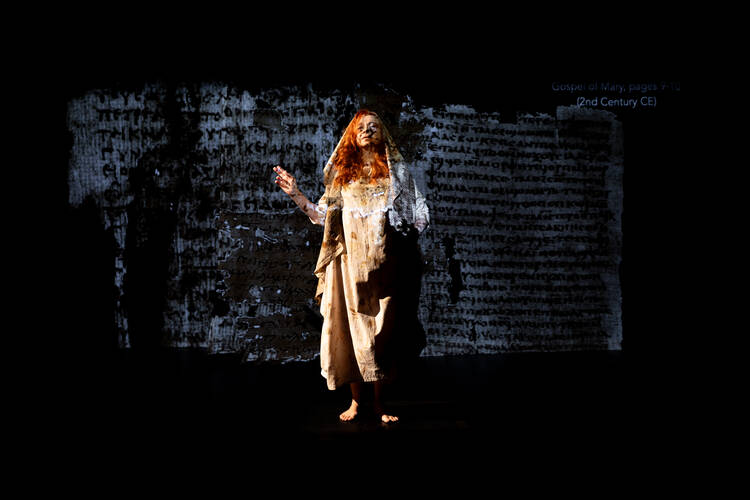On Easter Sunday in the year 591 A.D., Pope Gregory I made an error that would sully the reputation of one of Christ’s greatest followers for centuries. During a sermon, the pope wrongly conflated Mary Magdalene with the “unnamed sinner woman” who anointed Christ’s feet in the Book of Luke.
It would take nearly 1,400 years for this mistake to be rectified when Pope Paul VI in 1969 finally made the clarification that Mary Magdalene was indeed not a prostitute. But her misidentification as a “sinful” woman who eventually turned to God has persisted in both popular culture and the collective Catholic conscience.
Recently, theatrical productions, such as “Hamilton” and “Oh, Mary!”, have become popular modes to tell the stories of some of history’s most important figures. Mary Magdalene gets her turn with “Magdalene: I am the utterance of my name,” an experimental one-woman show from Sylvia Milo that seeks to reclaim Mary Magdalene’s image and story.
The production is broken up into seven different sections that explore the idea of what Ms. Milo identifies as the “Seven Magdalenes,” or the seven misunderstandings and realities of how the saint’s life is remembered, including depictions of her as an apostle and a hermit.
Throughout the play, Ms. Milo embodies a wide range of emotions and personas that Mary Magdalene is associated with, including the agony of the crucifixion, the ecstasy of seeing the risen Christ at his tomb and the seductive dances of the supposed prostitute.
“I think the arts can do an incredible service to history by shining light on stories that, for many reasons, were buried,” Ms. Milo said in an interview with America.
Ms. Milo believes that it is one thing to read about the lost histories of women like Mary Magdalene on the page, but “to take them on with my body and bring them to life in front of the audience so they can actually experience a person in front of them has been special.”
Utilizing an immersive audio-visual experience that includes sights and sounds from the French cave that served as Mary Magdalene’s hermitage, recorded readings of the Gospels and live composition from the production’s co-creator Nathan Davis, the set design and live score contribute to a deeply contemplative atmosphere that seeks to bring the viewer to a state of transcendence.
As part of her medieval legend, it was believed that as a hermit, Mary Magdalene was raised by angels seven times per day to “listen to the music of the heavens,” an experience that Mr. Davis sought to bring to the viewers with his live composition.
“To actually recreate something of the music of the heavens, which was going to be certainly different for every listener, I took inspiration from a couple of things,” Mr. Davis said.
The 13th-century text “refers to Mary hearing ‘the music of the heavens’ or ‘the music of the spheres,’ and that took on a very specific meaning for astronomers and musicians who are, in many cases, the same person throughout the Middle Ages,” he continued. “So the music that I use for those moments specifically are using the overtone series and these pitches which are also orbiting the audience in surround sound.”
Ms. Milo and Mr. Davis made another effective audio choice in reading accounts of Mary Magdalene’s life from the four canonical Gospels over each other, which represents how her story was muddled by her male counterparts.
“There are contradictions about her story in these Gospels, but in the end, it doesn't matter,” Ms. Milo said. “What mattered was that she was there and Jesus appeared to her. She witnesses him risen, and then she runs to the Apostles and tells the story. This is the first account, her words, her experience.”
Mary Magdalene’s significance is also buried in quite a literal way; in 1896, a text that has since become known as the Gospel of Mary was discovered in Egypt, beneath the surface of desert sands. Ms. Milo wanted to shine light on the idea that Mary Magdalene could be associated with a text as significant as a Christian Gospel.
Pages of the text appear behind Milo on stage, which places special emphasis on the controversial idea in the Gospel of Mary—one of the so-called “gnostic gospels”—that “there is no sin.”
“Her gospel says that sometimes we get out of our true nature, which is goodness, that's when sin appears,” Ms. Milo said. “But that’s not part of us; it’s a message of non-judgment and of seeing people through the eyes of love. It’s a beautiful message, and I’m really happy that we got to delve into it.”
Mr. Davis also sought to emphasize this message through his composition, incorporating the gentle noise of sand running through his fingers along with looping instrumentals, something that he also thought evoked “the sands of time.”
“That act of burying her text in the sand allowed 1800 years of preservation, which is remarkable,” Mr. Davis said. “You can look at it both in terms of the text being banned and attempted to be destroyed, but it was actually a great act of forethought and care that someone did this, and that’s what I’m trying to access as I’m playing with the sand.”
Partly a narrative story, partly a guided meditation and partly an avant-garde piece of theater, “I am the utterance of my name” may not right all of the wrongs that have been done upon Mary Magdalene’s image and story. But by giving its audience a chance to learn more about such an important yet misremembered woman, Ms. Milo and Mr. Davis are justly advocating for setting the record straight on one of Christianity’s most vital disciples.
“Magdalene: I am the utterance of my name” runs through this Sunday June 30 at HERE Arts Center in New York City.








